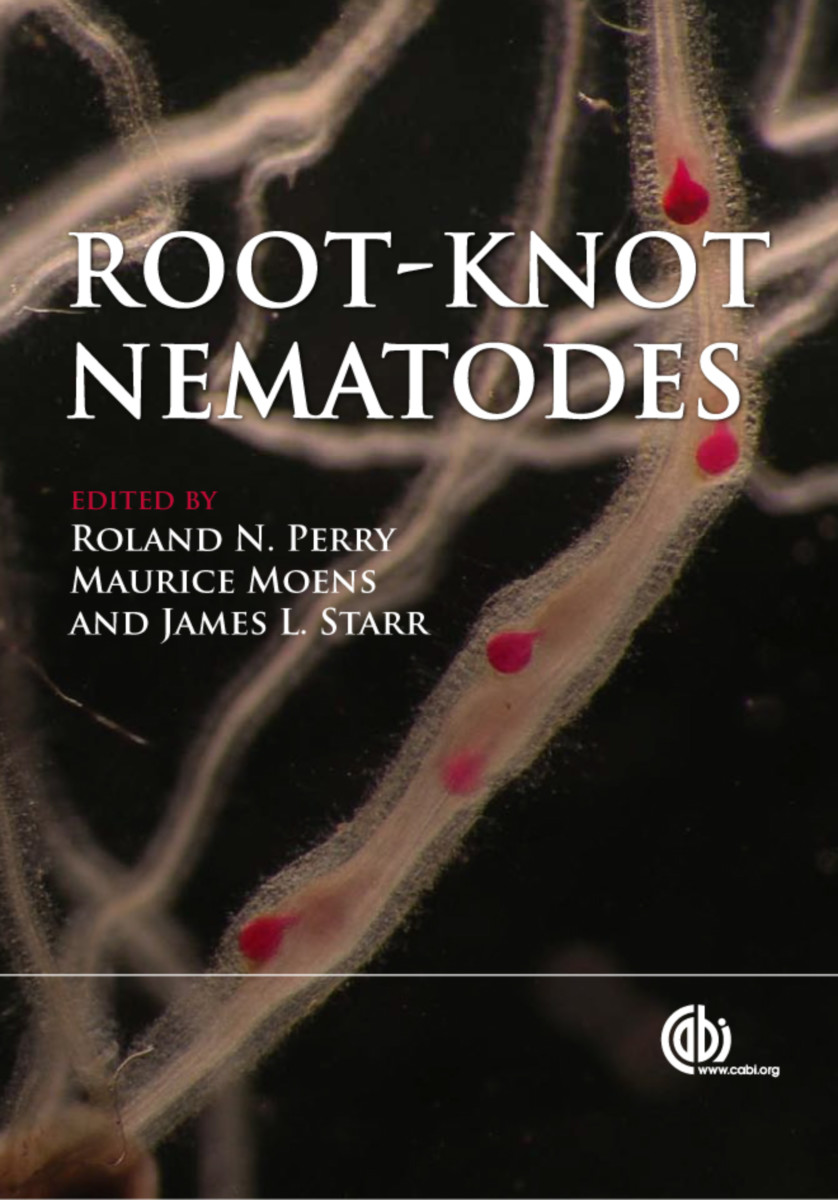Root-knot Nematodes
- Publisher
CABI - Published
2nd March 2010 - ISBN 9781845934927
- Language English
- Pages 520 pp.
- Size 6.875" x 9.75"
- Images 120 color illus
Root-knot nematodes are the most economically important group of plant-parasitic nematodes worldwide, and their control presents a major global challenge. Advances are being made in understanding their biology, host-parasite interaction and management strategies, and this comprehensive guide with many color photos and contributions from international experts covers the taxonomy, classification, morphology, life-cycle biology, genomes, resistance, sampling, detection, and management strategies of these pests, providing an essential reference for researchers, students and lecturers in plant nematology, plant pathology, agriculture, and agronomy.
"In a concise framework, the volume synthesizes a complex and rapidly developing field with an assemblage and evaluation of the most pertinent literature. This book undoubtedly will support research endeavors and innovations to better meet global challenges of root-knot nematodes, and provide a valuable resource for graduate education."
James G. Baldwin, University of California-Riverside - , The Quarterly Review of Biology
1. Meloidogyne species - A Diverse Group of Novel and Important Plant Parasites, 2. General Morphology, 3. Taxonomy, Identification and Principal Species, 4. Biochemical and Molecular Identification, 5. Molecular Taxonomy and Phylogeny, 6. Hatch and Host Location, 7. Invasion, Feeding and Development, 8. Reproduction, Physiology and Biochemistry, 9. Survival Strategies, 10. Interactions with Other Pathogens, 11. Population Dynamics and Damage Levels, 12. Distribution Patterns and Sampling, 13. Mechanisms and Genetics of Resistance, 14. Development of Resistant Varieties, 15. Plant Biotechnology and Control, 16. The Complete Sequence of the Genomes of Meloidogyne incognita and Meloidogyne hapla, 17. Biological Control through Microbial Pathogens, Endophytes and Antagonists, 18. Current and Future Management Strategies in Intensive Crop Production Systems, 19. Current and Future Management Strategies in Resource-Poor Farming
Roland N. Perry, PhD
Professor Roland Perry is based at the University of Hertfordshire, UK. He graduated with a BSc (Hons) in Zoology from Newcastle University, UK, where he also obtained a PhD in Zoology on physiological aspects of desiccation survival of Ditylenchus spp. After a year's post doctoral research at Newcastle, he moved to Keele University, UK, where he taught Parasitology; after 3 years at Keele, he was appointed to Rothamsted Experimental Station (now Rothamsted Research). His research interests centred primarily on plant-parasitic nematodes, especially focusing on nematode hatching, sensory perception, behavior and survival physiology, and several of his past PhD and post-doctoral students are currently involved in nematology research. He remained at Rothamsted until 2014, when he moved to the Department of Biological and Environmental Sciences, University of Hertfordshire. He co-edited The Physiology and Biochemistry of Free-living and Plant-parasitic Nematodes (1998), Root-knot Nematodes (2009), Molecular and Physiological Basis of Nematode Survival (2011), the first (2006) and second (2013) editions of the text book, Plant Nematology and Cyst Nematodes (2018) (all CAB International, UK). He is author or co-author of over 40 book chapters and refereed reviews and over 120 refereed research papers. He is joint Editor-in-Chief of Nematology and Chief Editor of the Russian Journal of Nematology. He is joint Editor of the book series Nematology Monographs and Perspectives. In 2001, he was elected Fellow of the Society of Nematologists (USA) in recognition of his research achievements; in 2008 he was elected Fellow of the European Society of Nematologists for outstanding contribution to the science of Nematology; and in 2011 he was elected Honorary Member of the Russian Society of Nematologists. He is a Visiting Professor at Ghent University, Belgium, where he lectures on nematode biology, focusing on physiology and behavior.
Maurice Moens, PhD
Maurice Moens is Honorary Director of Research at the Flanders Research Institute for Agriculture, Fisheries and Food (ILVO) at Merelbeke, Belgium and honorary professor at Ghent University, Belgium where he gave a lecture course on Agro-nematology at the Faculty of Bioscience Engineering. He is a past-director of the Post Graduate International Nematology Course (MSc Nematology) and coordinator of the Erasmus Mundus - European Master of Science in Nematology, where he gave five lecture courses on Plant Nematology. The MSc course is organized in the Faculty of Sciences of Ghent University. He graduated as an agricultural engineer from Ghent University and obtained a PhD at the same University on the spread of plant-parasitic nematodes and their management in hydroponic cropping systems. Within the framework of the Belgian Cooperation, he worked from 1972 to 1985 as a researcher in crop protection, including nematology, at two research stations in Tunisia. Upon his return to Belgium, he was appointed as senior nematologist at the Agricultural Research Centre (now ILVO). There, he expanded the research in plant nematology over various areas covering molecular characterization, biology of host-parasite relationships, biological control, resistance and other forms of non-chemical control. He was appointed head of the Crop Protection Department in 2000 and became Director of Research in 2006. He retired from both ILVO and Ghent University in 2012 but continued to supervise PhD students until 2017. In 2001, he was elected Fellow of the Society of Nematologists (USA) for outstanding contributions to Nematology; in the same year he was elected Fellow of the European Society of Nematologists for outstanding contribution to the science of Nematology. In 2012 he was elected Honorary Fellow of the Chinese Society for Plant Nematology, and in 2013 he became Honorary Member of the Russian Society of Nematologists. He supervised 27 PhD students, who are active in nematology all over the world. He is past-president of the European Society of Nematologists (2010-2014). He co-edited Root-knot Nematodes (2009) and the first (2006) and second (2013) editions of the text book, Plant Nematology. He is author or co-author of ten book chapters and refereed reviews and over 150 refereed research papers. He is a member of the editorial board of the Russian Journal of Nematology.
James L Starr
No information


